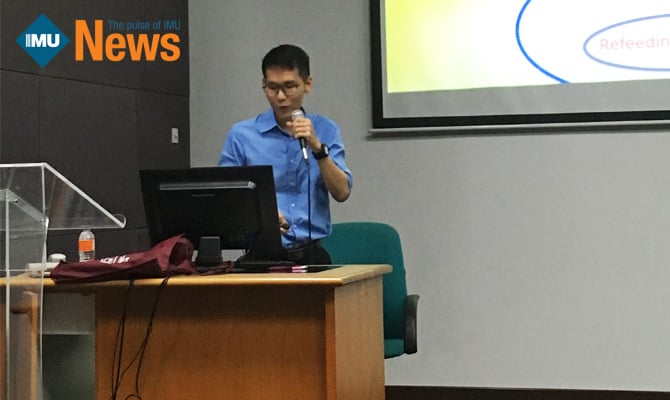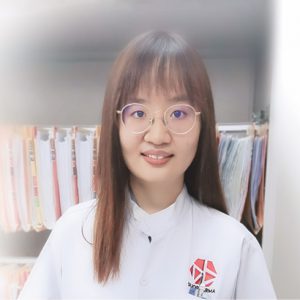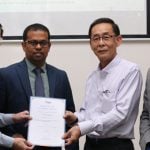10 May 2016 – This month’s talk, a joint collaboration between Malaysian Pharmaceutical Society–Young Pharmacist Chapter (MPS-YPC) and IMU Alumni, was titled ‘Acute Thiamine Deficiency and Refeeding Syndrome’. The talk was held at the IMU’s Bukit Jalil campus and was attended by practicing pharmacists, nutritionists, dieticians and pharmacy students. The speaker, Lim Kien Ping, is a Total Parenteral Nutrition Pharmacist in Hospital Kuala Lumpur. He obtained his Bachelor of Pharmacy (Hons) from University of Malaya and his Master of Clinical Pharmacy from the National University of Malaysia (UKM). 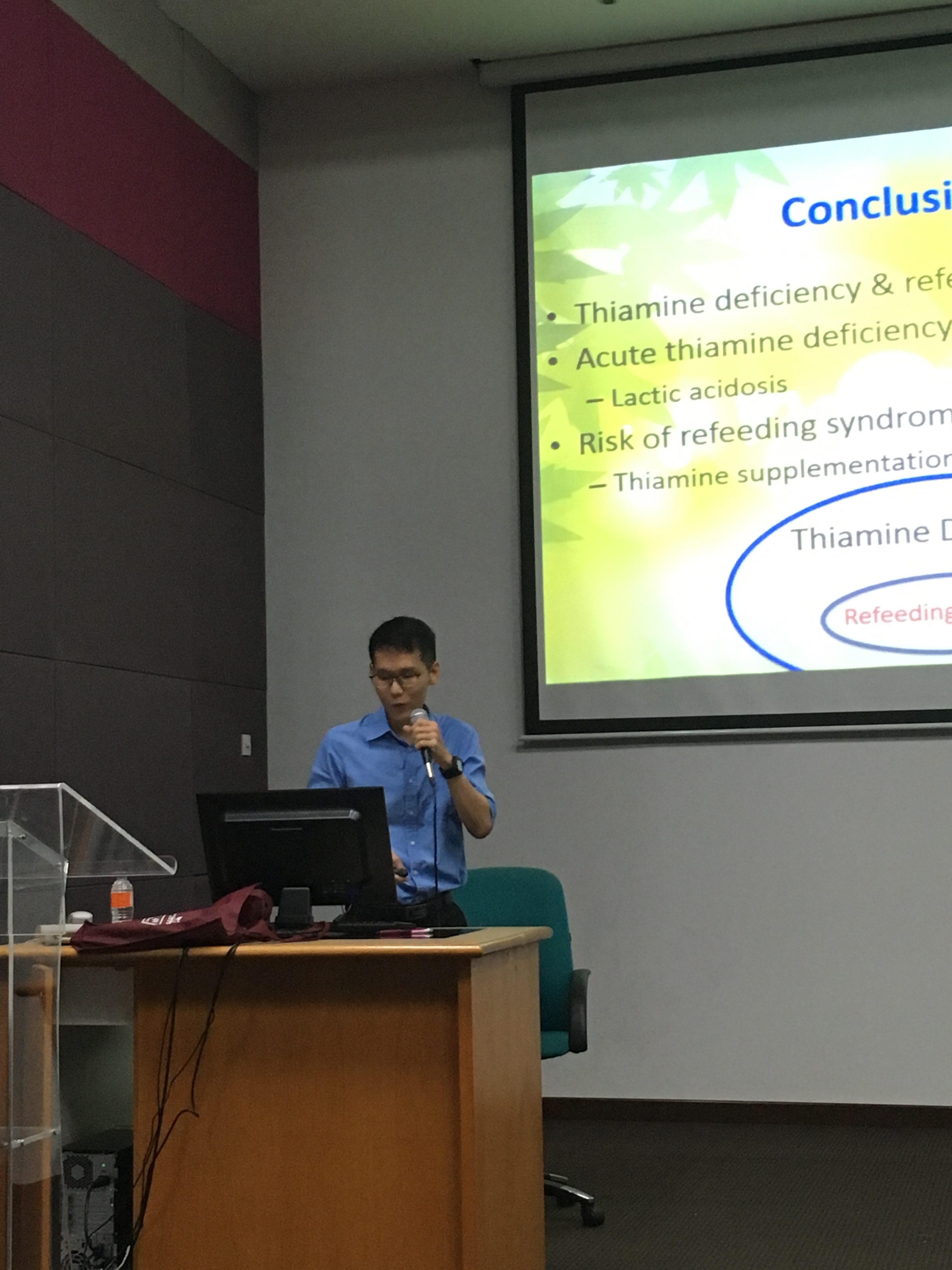 The first part of the talk centres around severe thiamine deficiency and its complications. Thiamine, or vitamin B1, is a water soluble vitamin found mainly in wholegrains, pork and liver. The speaker highlighted the importance of thiamine in several of our organ systems, especially in the metabolism of glucose. Beriberi and Wernicke-Korsakoff syndromes are examples of disease caused by thiamine deficiency.
The first part of the talk centres around severe thiamine deficiency and its complications. Thiamine, or vitamin B1, is a water soluble vitamin found mainly in wholegrains, pork and liver. The speaker highlighted the importance of thiamine in several of our organ systems, especially in the metabolism of glucose. Beriberi and Wernicke-Korsakoff syndromes are examples of disease caused by thiamine deficiency.
Infantile beriberi is more common in third-world countries due to malnutrition or undernourishment. Weakness and irritability are common signs of beriberi. Wernicke- Korsakoff syndrome, also known as cerebral beriberi, is more common in chronic alcoholics and clinically manifest as brain lesions and partial paralysis.
In the second part of the talk, the speaker spoke about refeeding syndrome, covering its definition and pathophysiology. Refeeding syndrome occurs when malnourished or undernourished patients are reintroduced to various nutrients such as carbohydrates. A common example is prisoners of World War II. When these prisoners were refed, metabolic complications arise whereby electrolytes such as potassium, phosphate and magnesium are taken up from the cells, causing depletion of serum levels of these electrolytes which, in many cases, led to fatality. 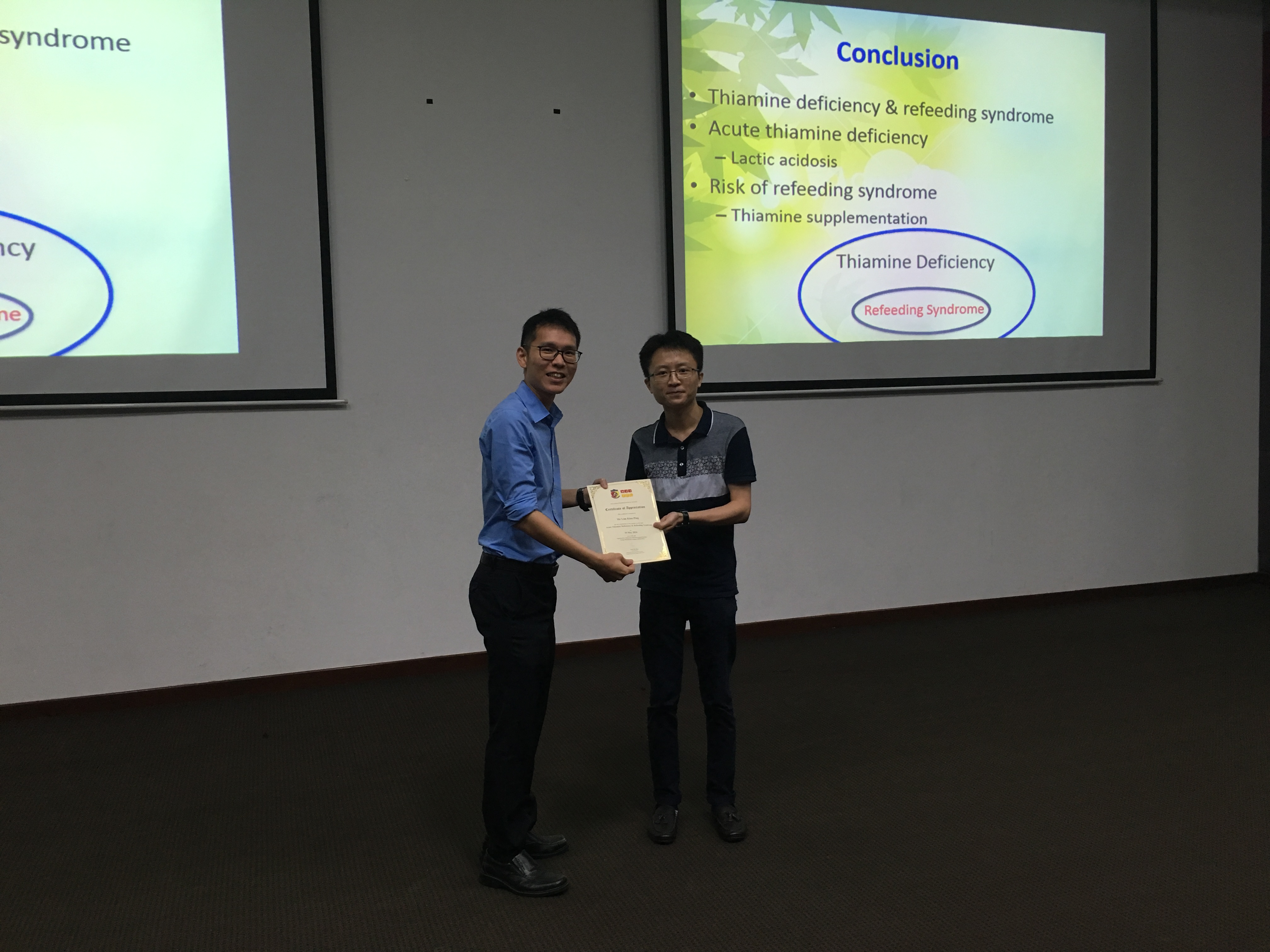 The speaker also touched on the relation of acute thiamine deficiency and refeeding syndrome. Due to low levels of thiamine in malnourished or undernourished patients, reintroduction of carbohydrate without supplementation of thiamine causes further depletion of thiamine as it is required in the breakdown of glucose. He then showed several examples of case reports on acute thiamine deficiency and refeeding syndrome to further solidify the audience’s understanding in the identification of signs and symptoms. Lastly, the speaker also talked about the management of thiamine deficiency and refeeding syndrome. The audience are generally satisfied with the speaker and the contents of the talk.
The speaker also touched on the relation of acute thiamine deficiency and refeeding syndrome. Due to low levels of thiamine in malnourished or undernourished patients, reintroduction of carbohydrate without supplementation of thiamine causes further depletion of thiamine as it is required in the breakdown of glucose. He then showed several examples of case reports on acute thiamine deficiency and refeeding syndrome to further solidify the audience’s understanding in the identification of signs and symptoms. Lastly, the speaker also talked about the management of thiamine deficiency and refeeding syndrome. The audience are generally satisfied with the speaker and the contents of the talk.
Being a pharmacy student myself, the talk was an eye opener as it gave me insight on the importance of adequate nourishment in maintaining good health and vital details to look out for such as supplementation of thiamine when refeeding patient.
The talk concluded with the presentation of a certificate of appreciation to the speaker by Lim Shi Hao, the chairperson of MPS-YPC. Written by Nicole Tay (Pharmacy Student)




